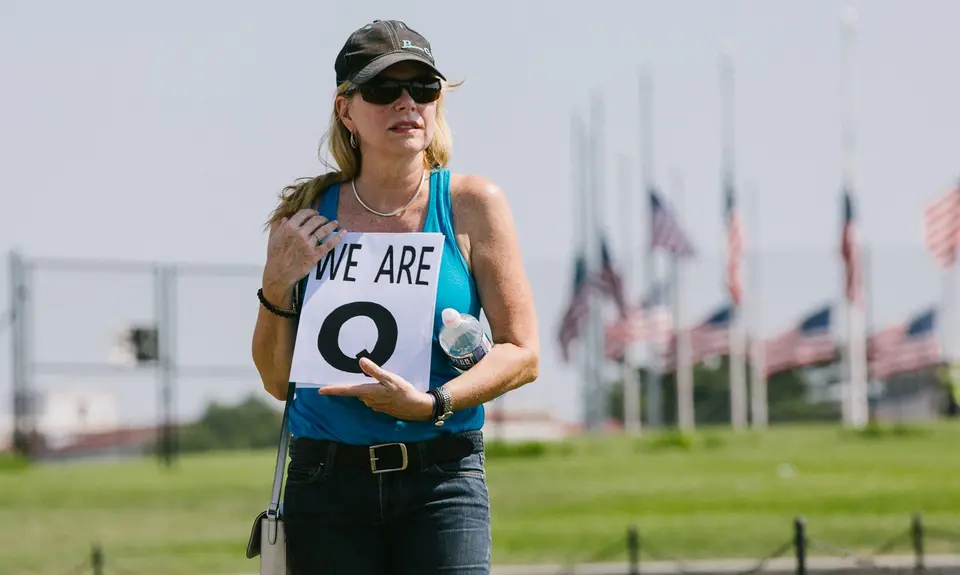Analysis
Michael Flynn served among the highest ranks of the U.S. military and obtained access to the nation’s most sensitive intelligence as President Donald Trump’s first national security adviser. On Saturday evening, he uploaded a video of himself and five other people reciting an oath popular among believers of the QAnon conspiracy movement, which the FBI considers a potential source of domestic terrorism.
Flynn stared into the camera, his hand raised, and recited the QAnon movement’s hallmark mantra: “Where we go one, we go all.” Sidney Powell, Flynn’s legal counsel, told the Washington Examiner that Flynn’s video had nothing to do with QAnon. That is obviously nonsense, but even if that were true, QAnon followers had already interpreted Flynn’s video as a sign of support.
General Michael Flynn made his friend group #TaketheOath and pledge to QAnon this 4th of July. pic.twitter.com/fhY7jwJmqW
— Italien Feeld? (@julianfeeld) July 5, 2020
Once considered an outlandish fringe conspiracy theory, the QAnon movement has taken its far-right conspiracy theories to the heart of the Republican Party with no sign of retreat. According to Media Matters senior researcher Alex Kaplan, 62 candidates for office have signaled support for the conspiracy theory, and 12 of those candidates have won Republican primaries. The GOP has been hesitant to repudiate the movement, and opportunities for party leadership to moderate its ranks have long since passed.
Marjorie Taylor Greene won a Republican primary in Georgia that placed her on a likely track to Congress despite the fact she has expressed support for QAnon. House Republicans denounced Greene but not for her conspiratorial beliefs. Instead, it was only after Politico surfaced a trove of videos in which Greene espoused racist and bigoted views that leading Republicans began to distance themselves from her candidacy. Another QAnon believer, Jo Rae Perkins in Oregon, won her primary and retained support from her Republican endorsers.
In less than three years, the QAnon movement is securing undeniable positions of influence under the Republican Party banner. GOP leaders could have stopped it, and now it may be too late.
In October 2017, an anonymous author began posting cryptic messages on 4chan’s “politically incorrect” message board, calling themself “Q” and claiming to be a top-level government official with access to classified intelligence information. "Q" offered far-right Trump supporters fantastical hopes that their perceived social and political enemies were about to be or had already been arrested for horrific crimes, like child sex trafficking, and acts of treason involving secret plans to undermine Trump. "Q" told followers that special counsel Robert Mueller’s investigation into Russian interference in the 2016 election never actually involved Trump and was a front for an investigation that targeted former President Barack Obama and former Secretary of State Hillary Clinton. And any day, "Q" promised, the public would learn the truth and those following along online would be vindicated. Reporter Paris Martineau wrote in New York magazine in 2017:
They believe all of this will be coming to a head any day now. That “The Storm” — of arrests, political turmoil, and Republican vindication — is coming. Though there have been some, uh, miscalculations as for exactly when.
More than two-and-half years have passed without Q's promised mass arrests, yet the conspiracy theory is as potent as ever, with new layers.
QAnon followers point to Flynn as an example of Republican vindication, portraying him as a patriot besieged by the deep state but who fought back and won. Even before his pledge, The Daily Beast reported that former three-star general had begun embracing his devout QAnon fans, granting the movement newfound validation and becoming what may be its highest-profile star to date.
The Center for Radical Right Analysis notes that the conspiracy theory has come to encapsulate a wider belief system containing, among other things, “an assortment of new age beliefs, the occult, and conspiracy theories with a dash of UFOs and ancient aliens.” Dave Hayes, a leading QAnon promoter known online as "Praying Medic," has declared that QAnon will “prove to be the end of all conspiracies.”
QAnon conspiracy theorist Dave Hayes predicts that "Q is going to prove to be the end of all conspiracies" by ultimately exposing the truth about everything from the sinking of the Titanic to the existence of aliens. https://t.co/FTo0i3xaVk pic.twitter.com/yRETgnY0IH
— Right Wing Watch (@RightWingWatch) April 24, 2020
The conspiracy theory has even crossed over into the Trump-loving religious right. Kevin Jessip, who is helping organize a large pro-Trump rally on the National Mall in September, has promoted QAnon theories mixed with Christian prophecy, and the Q-promoting, Christian streaming service Brio TV enjoyed a large presence at the National Religious Broadcasters 2020 Christian Media Convention.
Followers of QAnon have been linked to criminal activity, including kidnapping and murder. Despite this, the QAnon movement and the mainstream GOP have increasingly overlapped. In June, Eric Trump, son of the president, shared a QAnon image to his Instagram profile ahead of Trump’s rally in Tulsa, Oklahoma. Eric Trump later deleted the image without explanation. Roger Stone, a longtime ally of Trump and an early campaign adviser, told the hosts of a pro-QAnon podcast that he hoped the conspiracy theory was true. Trump has retweeted pro-QAnon accounts more than 130 times, QAnon-linked documentary films have achieved viral success on social media, QAnon believers have reliably attended Trump rallies, and organizers have put together several QAnon rallies across the United States.
Neither Trump nor members of his administration have denounced the movement, nor have leading Republicans in Congress. Meanwhile, conspiracy theorists like Ann Vandersteel have been telling Q followers that Republican Party leadership's silence is meant to be a tacit endorsement of their cause. It is unclear what the Republicans may gain in their complicity for the QAnon movement, although it would appear that some have adopted the mindset of conspiracy theorist Bill Mitchell, who has argued that people should not criticize the QAnon movement because even if it is false, Q is giving people confidence in Trump heading into the 2020 elections.
But one thing is for sure: Ignoring QAnon will not make it go away. If Republicans don’t come to grips with it soon, it could plague their party for years to come.






